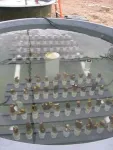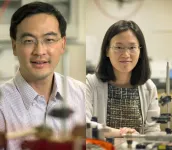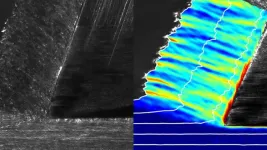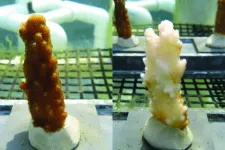(Press-News.org) Biomolecular condensates, the tiny combinations of proteins and mRNA forming membrane-less compartments within cells, have big potential implications for the future of not just plants but humans. On Sunday, August 6, at 9:00 am, the #PlantBio2023 plenary “Highlights of New and Emerging Research on Biomolecular Condensates in Plants” will dive into this new field and its recent discoveries.
“It’s going to be a great way to get your feet wet and understand what biomolecular condensates are,” said plenary convener Sterling Field of the Carnegie Institute for Science. “And for folks who are already familiar, they’ll get to hear the cutting-edge research on both regulation and formation.”
It’s only within the past few years that biomolecular condensates have emerged “as a mechanism in organizing transcriptional machineries and other cellular processes across the kingdoms of life,” explained Sheng-Yang He of Duke University.
“Overall, we’re learning whether manipulating regulators to survive stress or enhance growth can help with agriculture and climate change, as well as human health,” added Field. “When biomolecular condensates stop functioning properly, they turn over, the way human cells do. Of course, the proteins are plant specific, but the pathways are similar. Several neurodegenerative diseases in humans have been implicated.”
“If I was going to describe condensates with one word, it would be ‘dynamic,’” said Monika Chodasiewicz of King Abdullah University of Science & Technology. “The field is quite new, and there are still so many questions to be answered. I’m particularly interested in stress granules, which form within minutes and disassemble when the stressor is gone.”
“Recently we stumbled into GBPL3-Defence-Associated-Condensate (GDAC), a biomolecular condensate required for plant immunity that’s negatively impacted by abnormally warm temperatures,” He mentioned.
“Understanding the function of these condensates is going to be really important for agriculture in the coming years,” continued Field. “The foundation is being laid right now.”
Emilio Gutierrez-Beltran of the University of Sevilla will also speak. Read the plenary description, and see more scientific content in the complete Plant Biology 2023 program.
END
Plenary closeup: Biomolecular condensates the foundation for innovations to come
ASPB's Plant Biology 2023 details the big impact of micron-scale discoveries
2023-07-19
ELSE PRESS RELEASES FROM THIS DATE:
New Black baby equity clinic helps infants and moms flourish
2023-07-19
Not being heard, not being taken seriously and being misunderstood by health care providers often describes a routine medical visit for many Black parents. For Black parents of young children, that lack of cultural understanding can lead to grim consequences for the health of the baby and mother.
According to the California Department of Public Health, Black babies in the Bay Area are two to three times more likely to be born too soon or too small or to die before their first birthday, compared to white babies. Scientific evidence points to structural racism and a systemic lack ...
Dual wavelengths of light effective against antibiotic-resistant bacterium
2023-07-19
Scientists have combined two light wavelengths to deactivate a bacterium that is invulnerable to some of the world’s most widely used antibiotics, giving hope that the regime could be adapted as a potential disinfectant treatment.
Under the guidance of project leader Dr Gale Brightwell, scientists at New Zealand’s AgResearch demonstrated the novel antimicrobial efficiency of a combination of two light wavelengths against a ‘superbug’ known as antibiotic-resistant extended-spectrum beta-lactamase E. coli.
Antimicrobial resistance (AMR) is a major global threat of ...
Learning from superheroes and AI: UW researchers study how a chatbot can teach kids supportive self-talk
2023-07-19
At first, some parents were wary: An audio chatbot was supposed to teach their kids to speak positively to themselves through lessons about a superhero named Zip. In a world of Siri and Alexa, many people are skeptical that the makers of such technologies are putting children’s welfare first.
Researchers at the University of Washington created a new web app aimed to help children develop skills like self-awareness and emotional management. In Self-Talk with Superhero Zip, a chatbot guided pairs of siblings ...
Consortium explores energy-efficient electronics and photonics
2023-07-19
The University of Texas at Arlington is part of a new consortium funded by the Department of Energy that involves the development of new technologies and college courses covering everything from radiation detection to nuclear engineering.
The grant also will help UTA develop 2D materials that can be integrated into new hand-held photonic technologies with multiple uses.
Electrical Engineering Professor Weidong Zhou and Associate Professor Alice Sun will use the five-year, $1.8 million grant to work with collaborators at UT Arlington, University of North Texas, University of Arkansas Pine Bluff, ...
Staying sharp: Researchers turn to an everyday shop tool to study how materials behave
2023-07-19
Researchers at Texas A&M University are taking a traditional manufacturing tool — metal cutting — and developing a more accessible method for understanding the behavior of metals under extreme conditions.
Metal cutting – scraping a thin layer of material from a metal’s surface using a sharp knife (not unlike how we scrape butter) – might not be the first thing that comes to mind for studying material properties. However, Drs. Dinakar Sagapuram and Hrayer Aprahamian, assistant professors ...
Bipolar disorder linked to 6-fold heightened risk of early death from external causes
2023-07-19
People with bipolar disorder—characterised by extreme mood swings—are 6 times more likely to die before their time from external causes, such as accidents, violence, and suicide, than those without the condition, finds research published in the open access journal BMJ Mental Health.
And they are twice as likely to die from somatic (physical) causes, with alcohol a major contributing factor, the findings show.
A heightened risk of an early death from any cause has been consistently reported in those with ...
Tripling in proportion of smokers’ duty free tobacco purchases in England since 2019
2023-07-19
The proportion of smokers’ duty free tobacco purchases in England has tripled since 2019, rising from just over 5% to just over 16%, but there’s been no reported change in black market purchases, reveals a time-trends analysis published online in the journal Tobacco Control.
Between 2002 and 2014, between 12% and 20% of UK adult smokers said their last tobacco purchase had been from a low or untaxed source. And smokers who buy their tobacco from low/untaxed sources—and those who switch to cheaper products—are less likely to try to quit smoking than those ...
Explore psilocybin and other psychedelics for women’s cancer distress, urge doctors
2023-07-19
It’s time to stop prevaricating and explore the use of psilocybin—the active ingredient in ‘magic mushrooms’—and other psychedelics to ease the often overwhelming distress faced by women with late stage gynaecological cancers, urge doctors in a commentary published online in the International Journal of Gynecological Cancer.
Conventional ‘gold standard’ psychotherapeutic approaches, such as cognitive behavioural therapy (CBT), take too long to change old habits and require too much stamina, suggest the authors from the University of Texas ...
Some corals may survive climate change without paying a metabolic price
2023-07-19
UNIVERSITY PARK, Pa. — If, as the saying goes, ‘nothing in life is free,’ then corals might pay a price for being resilient to climate change. Indeed, the prevailing belief among scientists has been that corals must suffer reduced growth or other tradeoffs when they partner with symbiotic algae that help them tolerate warmer water. Yet, new research led by Penn State demonstrates that certain corals can have their cake and eat it too, and as a result, these coral-symbiont partnerships may come to dominate ...
Study shows differences in how patients with heroin use disorder process drug and reward cues
2023-07-18
An Icahn School of Medicine at Mount Sinai study sheds new light on some of the underlying neurobiological mechanisms of opioid addiction, which accounted for three-quarters of the more than 100,000 fatal drug overdoses in the United States in 2021.
The Mount Sinai researchers found that inpatients with heroin use disorder exhibited a bias in favor of processing drug cues over cues related to natural, non-drug rewards, as observed during passive viewing of the cues and when the patients were asked to try two emotional regulation strategies. Results of the study were published in the July 12 issue of the American Journal ...
LAST 30 PRESS RELEASES:
National Reactor Innovation Center opens Molten Salt Thermophysical Examination Capability at INL
International Progressive MS Alliance awards €6.9 million to three studies researching therapies to address common symptoms of progressive MS
Can your soil’s color predict its health?
Biochar nanomaterials could transform medicine, energy, and climate solutions
Turning waste into power: scientists convert discarded phone batteries and industrial lignin into high-performance sodium battery materials
PhD student maps mysterious upper atmosphere of Uranus for the first time
Idaho National Laboratory to accelerate nuclear energy deployment with NVIDIA AI through the Genesis Mission
Blood test could help guide treatment decisions in germ cell tumors
New ‘scimitar-crested’ Spinosaurus species discovered in the central Sahara
“Cyborg” pancreatic organoids can monitor the maturation of islet cells
Technique to extract concepts from AI models can help steer and monitor model outputs
Study clarifies the cancer genome in domestic cats
Crested Spinosaurus fossil was aquatic, but lived 1,000 kilometers from the Tethys Sea
MULTI-evolve: Rapid evolution of complex multi-mutant proteins
A new method to steer AI output uncovers vulnerabilities and potential improvements
Why some objects in space look like snowmen
Flickering glacial climate may have shaped early human evolution
First AHA/ACC acute pulmonary embolism guideline: prompt diagnosis and treatment are key
Could “cyborg” transplants replace pancreatic tissue damaged by diabetes?
Hearing a molecule’s solo performance
Justice after trauma? Race, red tape keep sexual assault victims from compensation
Columbia researchers awarded ARPA-H funding to speed diagnosis of lymphatic disorders
James R. Downing, MD, to step down as president and CEO of St. Jude Children’s Research Hospital in late 2026
A remote-controlled CAR-T for safer immunotherapy
UT College of Veterinary Medicine dean elected Fellow of the American Academy of Microbiology
AERA selects 34 exemplary scholars as 2026 Fellows
Similar kinases play distinct roles in the brain
New research takes first step toward advance warnings of space weather
Scientists unlock a massive new ‘color palette’ for biomedical research by synthesizing non-natural amino acids
Brain cells drive endurance gains after exercise
[Press-News.org] Plenary closeup: Biomolecular condensates the foundation for innovations to comeASPB's Plant Biology 2023 details the big impact of micron-scale discoveries






